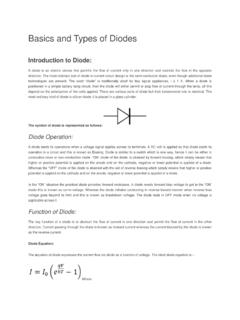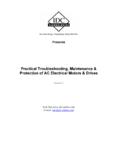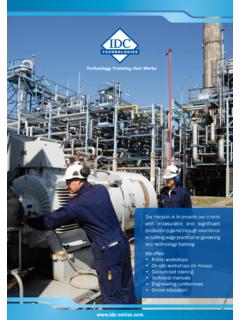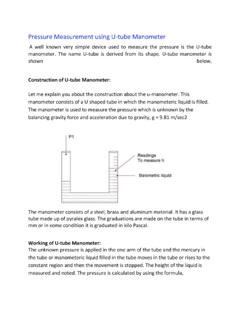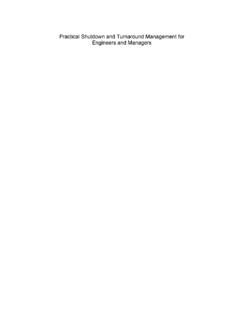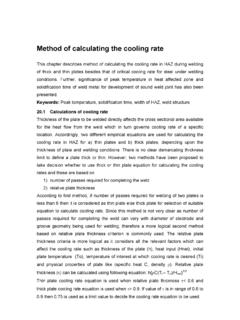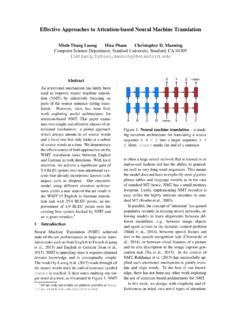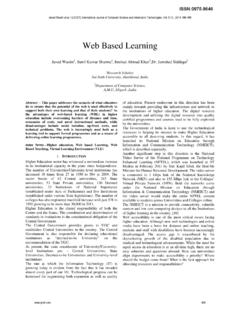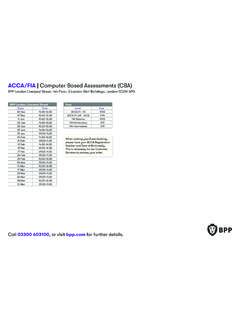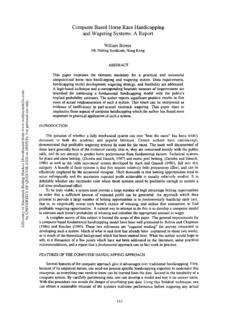Transcription of Introduction to Computer Based Control Systems
1 Introduction to Computer Based Control Systems Introduction to Computer Based Control Systems WHO ARE WE? IDC Technologies is internationally acknowledged as the premier provider of practical, technical training for engineers and technicians. We specialize in the fields of electrical Systems , industrial data communications, telecommunications, automation and Control , mechanical engineering, chemical and civil engineering, and are continually adding to our portfolio of over 60 different workshops. Our instructors are highly respected in their fields of expertise and in the last ten years have trained over 200,000 engineers, scientists and technicians. With offices conveniently located worldwide, IDC Technologies has an enthusiastic team of professional engineers, technicians and support staff who are committed to providing the highest level of training and consultancy. TECHNICAL WORKSHOPS TRAINING THAT WORKS We deliver engineering and technology training that will maximize your business goals.
2 In today s competitive environment, you require training that will help you and your organization to achieve its goals and produce a large return on investment. With our training that works objective you and your organization will: Get job-related skills that you need to achieve your business goals Improve the operation and design of your equipment and plant Improve your troubleshooting abilities Sharpen your competitive edge Boost morale and retain valuable staff Save time and money EXPERT INSTRUCTORS We search the world for good quality instructors who have three outstanding attributes: 1. Expert knowledge and experience of the course topic 2. Superb training abilities to ensure the know-how is transferred effectively and quickly to you in a practical, hands-on way 3. Listening skills they listen carefully to the needs of the participants and want to ensure that you benefit from the experience. Each and every instructor is evaluated by the delegates and we assess the presentation after every class to ensure that the instructor stays on track in presenting outstanding courses.
3 HANDS-ON APPROACH TO TRAINING All IDC Technologies workshops include practical, hands-on sessions where the delegates are given the opportunity to apply in practice the theory they have learnt. REFERENCE MATERIALS A fully illustrated workshop book with hundreds of pages of tables, charts, figures and handy hints, plus considerable reference material is provided FREE of charge to each delegate. CERTIFICATE OF ATTENDANCE Each delegate receives a Certificate of Attendance documenting their experience. 100% MONEY BACK GUARANTEE IDC Technologies engineers have put considerable time and experience into ensuring that you gain maximum value from each workshop. If by lunchtime on the first day you decide that the workshop is not appropriate for your requirements, please let us know so that we can arrange a 100% refund of your fee. THIS BOOK WAS DEVELOPED BY IDC TECHNOLOGIES ONSITE WORKSHOPS All IDC Technologies Training Workshops are available on an on-site basis, presented at the venue of your choice, saving delegates travel time and expenses, thus providing your company with even greater savings.
4 OFFICE LOCATIONS AUSTRALIA CANADA INDIA IRELAND MALAYSIA NEW ZEALAND SINGAPORE SOUTH AFRICA UNITED KINGDOM UNITED STATES On-Site Training All IDC Technologies Training Workshops are available on an on-site basis, presented at the venue of your choice, saving delegates travel time and expenses, thus providing your company with even greater savings. For more information or a FREE detailed proposal contact Kevin Baker by e-mailing: SAVE MORE THAN 50% OFF the per person costCUSTOMISE the training to YOUR WORKPLACE!Have the training delivered WHEN AND WHERE you need it! IDC TECHNOLOGIES Worldwide Offices AUSTRALIA Telephone: 1300 138 522 Facsimile: 1300 138 533 West Coast Office 1031 Wellington Street, West Perth, WA 6005 PO Box 1093, West Perth, WA 6872 CANADA Toll Free Telephone: 1800 324 4244 Toll Free Facsimile: 1800 434 4045 Suite 402, 814 Richards Street, Vancouver, NC V6B 3A7 INDIA Telephone : +91 444 208 9353 35 4th Street, Kumaran Colony, Vadapalani, Chennai 600026 IRELAND Telephone : +353 1 473 3190 Facsimile: +353 1 473 3191 Caoran, Baile na hAbhann Co.
5 Galway MALAYSIA Telephone: +60 3 5192 3800 Facsimile: +60 3 5192 3801 26 Jalan Kota Raja E27/E, Hicom Town Center Seksyen 27, 40400 Shah Alam, Selangor NEW ZEALAND Telephone: +64 9 263 4759 Facsimile: +64 9 262 2304 Parkview Towers, 28 Davies Avenue, Manukau City PO Box 76-142, Manukau City SINGAPORE Telephone: +65 6224 6298 Facsimile: + 65 6224 7922 100 Eu Tong Sen Street, #04-11 Pearl s Centre, Singapore 059812 SOUTH AFRICA Telephone: +27 11 024 5520 Facsimile: +27 86 692 4368 68 Pretorius Street, President Park, Midrand PO Box 389, Halfway House 1685 UNITED KINGDOM Telephone: +44 20 8335 4014 Facsimile: +44 20 8335 4120 Suite 18, Fitzroy House, Lynwood Drive, Worcester Park, Surrey KT4 7AT UNITED STATES Toll Free Telephone: 1800 324 4244 Toll Free Facsimile: 1800 434 4045 10685-B Hazelhurst Dr. # 6175, Houston, TX 77043 Website: Email: Presents Introduction to Computer Based Control Systems Revision 1 Website: E-mail: IDC Technologies Pty Ltd PO Box 1093, West Perth, Western Australia 6872 Offices in Australia, New Zealand, Singapore, United Kingdom, Ireland, Malaysia, Poland, United States of America, Canada, South Africa and India Copyright IDC Technologies 2012.
6 All rights reserved. All rights to this publication, associated software and workshop are reserved. No part of this publication may be reproduced, stored in a retrieval system or transmitted in any form or by any means electronic, mechanical, photocopying, recording or otherwise without the prior written permission of the publisher. All enquiries should be made to the publisher at the address above. Disclaimer Whilst all reasonable care has been taken to ensure that the descriptions, opinions, programs, listings, software and diagrams are accurate and workable, IDC Technologies do not accept any legal responsibility or liability to any person, organization or other entity for any direct loss, consequential loss or damage, however caused, that may be suffered as a result of the use of this publication or the associated workshop and software. In case of any uncertainty, we recommend that you contact IDC Technologies for clarification or assistance. Trademarks All logos and trademarks belong to, and are copyrighted to, their companies respectively.
7 Acknowledgements IDC Technologies expresses its sincere thanks to all those engineers and technicians on our training workshops who freely made available their expertise in preparing this manual. Contents Introduction to Computer Based Control Systems 1 Introduction to Computer Based measurement and Control Systems 1 Role of computers in measurement and (process) Control 3 Basic components of Computer Based measurement and Control Systems 4 Architecture Computer Based process Control system 7 Human Machine Interface (HMI) 12 Hardware for Computer Based process Control system 13 Interfacing Computer system with process 19 Economics of Computer Based system for industrial application 24 1 Introduction to Computer Based Control Systems While the fundamental purposes and functions of Instrumentation Systems have remained the same from its inception, there is a paradigm shift, over the years, in methodology of measurement, interpretation and Control , due to, continuous technological innovations.
8 The Introduction of fast and accurate digital technology and components such as analog-to-digital converters, microprocessors and transducers associated with revolutionary advancements in communication technology has replaced natural scale-up versions of manual monitoring and Control to highly advanced automated process monitoring and Control Systems . This chapter introduces the concepts of hardware, software, and communication aspects of Computer aided measurement and Control Systems and discusses techno-commercial benefits of such Systems for its application in process industries. In this chapter we will learn the following: Introduction to Computer Based measurement and Control Systems Role of computers in process Control Basic components of Computer Based measurement and Control system Architecture of Computer Based Control Human Machine Interface (HMI) Hardware of Computer Based process Control system Interfacing Computer system with process Economics of Computer Based system for industrial application Introduction to Computer Based measurement and Control Systems The industrial revolution has contributed largely in the development of machine Based Control where machines in process industries were took over the work done by human physical power.
9 The early production processes were natural scale-up versions of the traditional manual practices. These were designed as batch process which later was expanded to continuous processes, resulting in economical and technological benefits. The industrial process Control has modernized with modernization of industries. Process Control is therefore not a discovery of recent past, but is rather as old as the industry itself. The engineers and designers of process industries always tried to automate the processes as much as possible and to do so, brought in measuring instruments. Thus the need of better instrumentation and automatic Control became the dominant reason for better operation of industrial processes. Conversely, the advancement in 2 Distributed Control Systems 2 instrumentation and Control contributed to the development of larger and more complex processes, bringing numerous technological and economical benefits to the operator.
10 The earliest recorded suggestions for use of Computer for measurement and Control (in real-time) application were made by Brown and Campbell in their paper in 1950. The paper contained the diagram, as shown in Figure below. In this specific reporting the Computer was used in both feedback and feed-forward loops. These scientists also suggested using digital computing elements (logics) for setting up the Control The first digital Computer developed specifically for Control (in real-time application) was for airborne (military) operation, and in 1954 a digitrac digital Computer was successfully used to provide an automatic flight and weapons Control system. Figure The proposed use of Computer in measurement and Control Late 1950s itself saw the application of digital computers in industrial measurement & Control for the purpose of process Control . The first industrial Computer Control system, called RW 300 system (of Ramo-Wooldridge Company) was installed at Port Arthur refinery of Texaco Company in Texas.
